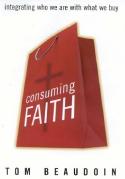Issue Date: May 28, 2004
The sordid boon of getting and spending among brand-name Christians Reviewed by RICH HEFFERN I traveled in the former Soviet Union in the 1970s. What struck me most then was the total absence of billboards and advertising in both urban and rural areas. They were nonexistent and, to one accustomed to the West, it seemed as though something essential was missing. That perception, I think, said more about me and where I came from than it did about the Russians. Also, stores were hard to find and, when one was located, there followed a Byzantine process that involved standing in line to find the price of an item -- a loaf of bread, say -- then standing in another line to pay, whereupon one would receive a ticket, which meant standing in yet another line to present the ticket in exchange for the actual loaf of bread. This system solved the unemployment problem, of course, but showed like nothing else a built-in bias against consumerism. Yearning for something to buy, however, brought down the Iron Curtain more surely perhaps than anything else. Now consumerism, politics and spiritual yearnings are all linked somewhat mysteriously together. Tom Beaudoin is visiting assistant professor of theology at Boston College and the author of Virtual Faith: The Irreverent Spiritual Search of Generation X. In his earlier book, Beaudoin examined the spiritual searching of his contemporaries, finding that the youth of today are hungry for actual religious experience. His latest book looks at how the phenomenon of branding works in the lives of the post-1960s generations and why brands have a spiritual significance for all of us. He examines the current landscape where product brand names are so important to young adults, then makes connections between economics and spirituality, noting that Jesus pointed out a way in which spirituality and economics are part of one full and flourishing life. His aim is to show what the brand economy is all about, what it really means. He neither celebrates nor vilifies it. Rather he shows that “it is a spiritual force to be reckoned with, and that people are not idiotic dupes of advertisers but soulfully hungry persons looking for a way to bring a sense of meaningful discipline to their lives.” Beaudoin contends that the brand economy and spiritual traditions today have some things to learn from each other. He centers his investigation on the importance of our bodies, reminding us that we are spirits enfleshed and can really do nothing outside of this bodiliness. The concept of the “body” of Christ then is central to understanding Christian spirituality and underscores the importance of that spirituality being an economic one. Beaudoin urges thinking like this: “I gaze down at my brands: shoes, jeans, shirts, gadgets, toys … at the same time I know that the materials that enable my comfort were forged under fluorescent lights in a large room of young women half a world away. I am thus doubly connected to even the far reaches of this planet. Those who make the stuff of my world that I use and find pleasure and comfort in … are already a part of me. Economic spirituality means fulfilling my part of my economic relationship with my global neighbor, the one who is part of the world on which my material or even religious body depends. … The body of Christ is thus deeply intertwined with all of nature that is not this body, and with the other human cultures that clothe, feed and entertain this body.” Beaudoin is concerned with how faith communities can sponsor attention to branding and suggests practical ways forward on this front, saying that churches can emulate the prophets and confront people directly with a faith-based imperative of changing our economic ways. He warns though that this can lapse into self-righteous preaching. He advocates an indirect approach that engages a commitment to spiritual discernment and growth, “suspicious of the idea that God’s grace is a set of coins stored in a chest that the church may give out when someone practices piety.” Jesus said that he came to give us life, and life in abundance. Tom Beaudoin invites us to integrate our passion for both spirituality and purchasing into that fuller, richer life. Rich Heffern is a frequent contributor to NCR. His email address is heffern@diocesekcsj.org. National Catholic Reporter, May 28, 2004 |
